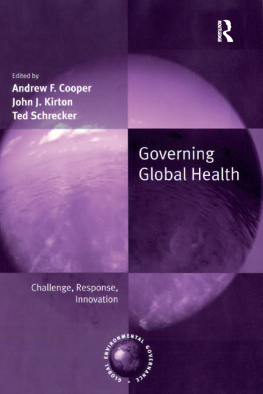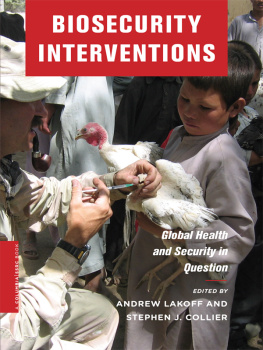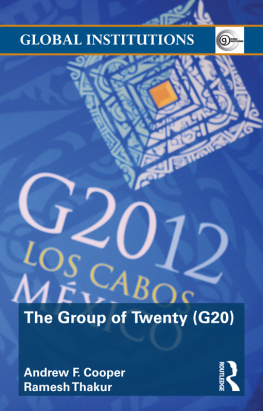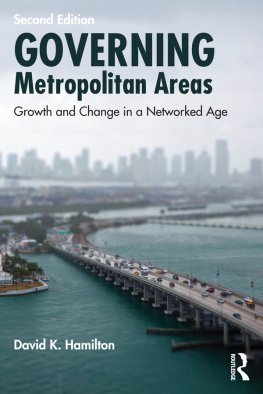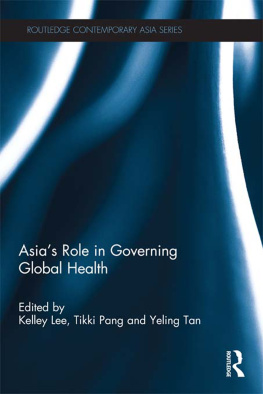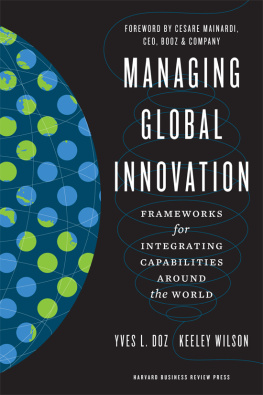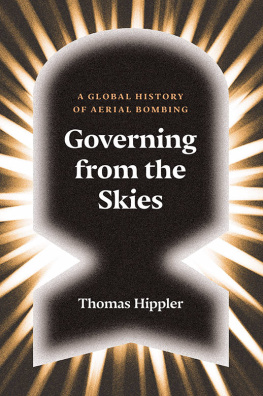GOVERNING GLOBAL HEALTH
Global Environmental Governance Series
Series Editor: John J. Kirton
Global Environmental Governance addresses the new generation of twenty-first century environmental problems and the challenges they pose for management and governance at the local, national, and global levels. Centred on the relationships among environmental change, economic forces, and political governance, the series explores the role of international institutions and instruments, national and sub-federal governments, private sector firms, scientists, and civil society, and provides a comprehensive body of progressive analyses on one of the worlds most contentious international issues.
Also in the series
A World Environment Organization
Edited by Frank Biermann and Steffen Bauer
ISBN 978-0-7546-3765-3
Sustainability, Civil Society and International Governance
Edited by John J. Kirton and Peter I. Hajnal
ISBN 978-0-7546-3884-1
Bilateral Ecopolitics
Edited by Philippe Le Prestre and Peter Stoett
ISBN 978-0-7546-4177-3
Governing Global Desertification
Edited by Pierre Marc Johnson, Karel Mayrand and Marc Paquin
ISBN 978-0-7546-4359-3
Participation for Sustainability in Trade
Edited by Sophie Thoyer and Benot Martimort-Asso
ISBN 978-0-7546-4679-2
Governing Global Health
Challenge, Response, Innovation
Edited by
ANDREW F. COOPER
Centre for International Governance Innovation, Canada
JOHN J. KIRTON
University of Toronto, Canada
TED SCHRECKER
University of Ottawa, Canada
First published 2007 by Ashgate Publishing
Published 2016 by Routledge
2 Park Square, Milton Park, Abingdon, Oxon OX14 4RN
711 Third Avenue, New York, NY 10017, USA
Routledge is an imprint of the Taylor & Francis Group, an informa business
Copyright Andrew F. Cooper, John J. Kirton, and Ted Schrecker 2007
Andrew F. Cooper, John J. Kirton and Ted Schrecker have asserted their right under the Copyright, Designs and Patents Act, 1988, to be identified as the editors of this work.
All rights reserved. No part of this book may be reprinted or reproduced or utilised in any form or by any electronic, mechanical, or other means, now known or hereafter invented, including photocopying and recording, or in any information storage or retrieval system, without permission in writing from the publishers.
Notices:
Product or corporate names may be trademarks or registered trademarks, and are used only for identification and explanation without intent to infringe.
British Library Cataloguing in Publication Data
Governing global health : challenge, response, innovation.
- (Global environmental governance)
1. Group of Eight (Organization) 2. Public health -
International cooperation
I. Cooper, Andrew Fenton, 1950- II. Kirton, John J.
III. Schrecker, Ted
362.1
Library of Congress Control Number: 2006938318
ISBN: 9780754648734 (hbk)
Contents
Andrew F. Cooper, John J. Kirton, and Ted Schrecker
Mark W. Zacher
James Orbinski
David P. Fidler
Nick Drager and Laura Sunderland
Colin I. Bradford, Jr.
Chantal Blouin
Lee-Nah Hsu and Jessica White
John J. Kirton and Jenevieve Mannell
Obijiofor Aginam
John J. Kirton and Ella Kokotsis
Ted Schrecker, Ronald Labont, and David Sanders
Colleen OManique
Andrew F. Cooper, John J. Kirton, and Ted Schrecker
List of Tables
List of Figures
List of Contributors
Obijiofor Aginam is Associate Professor in the Department of Law at Carleton University.
Chantal Blouin is Senior Researcher in Trade and Development at the North-South Institute.
Colin I. Bradford, Jr. is a non-resident Senior Fellow at the Brookings Institution, directing a global governance project co-sponsored by the Centre for International Governance Innovation.
Andrew F. Cooper is Associate Director of the Centre for International Governance Innovation and Professor of Political Science at the University of Waterloo.
Nick Drager is Senior Advisor in the Department of Ethics, Trade, Human Rights, and Health Law at the World Health Organization.
David P. Fidler is Professor of Law and the Harry T. Ice Faculty Fellow at Indiana Universitys School of Law and a Senior Scholar at the Center for Law and the Publics Health at Georgetown and Johns Hopkins universities.
Lee-Nah Hsu is a Health and Community Development Consultant and Visiting Professor at Mahidol University in Bangkok. She is also a member of the Technical Review Panel of the Global Fund to Fight AIDS, Tuberculosis, and Malaria.
John J. Kirton is Director of the G8 Research Group and Associate Professor of Political Science at the University of Toronto.
Ella Kokotsis is Director of Analytical Studies of the G8 Research Group.
Ronald Labont is Canada Research Chair in Globalization and Health Equity at the Institute of Population Health at the University of Ottawa.
Jenevieve Mannell is a researcher with the G8 Research Group and a social communication specialist with a background in private enterprise, the Canadian mental health system, and international public health.
Colleen OManique is Associate Professor of Womens Studies at Trent University.
James Orbinski is a Research Scientist and Associate Professor of Family and Community Medicine at St. Michaels Hospital in Toronto and Associate Professor in the Department of Political Science at the Munk Centre for International Studies, both at the University of Toronto.
David Sanders is founding director of the School of Public Health at the University of the Western Cape in South Africa.
Ted Schrecker is a scientist with the rank of Associate Professor at the Institute of Population Health at the University of Ottawa.
Laura Sunderland is Senior Researcher with the G8 Research Group.
Jessica White is an intern in the Ecosystems Approaches to Human Health Programme Initiative at the International Development Research Centre.
Mark W. Zacher is Acting Director of the Centre of International Relations at the University of British Columbia.
Preface and Acknowledgements
This volume was inspired by the contemporary health crisis in the world and the manifest failure of the existing galaxy of global governance arrangements to cope. It thus takes as its central theme the need for innovation, in both the ideas and institutions of global health governance that have dominated for so long, still stand in first place today, but are being rapidly being reformed and potentially even replaced by new entrants in the field.

